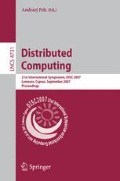Abstract
Byzantine-fault-tolerant service protocols like Q/U and FaB Paxos that optimistically order requests can provide increased efficiency and fault scalability. However, these protocols require n ≥ 5b+ 1 servers (where b is the maximum number of faults tolerated), owing to their use of opaque Byzantine quorum systems; this is 2b more servers than required by some non-optimistic protocols. In this paper, we present a family of probabilistic opaque Byzantine quorum systems that require substantially fewer servers. Our analysis is novel in that it assumes Byzantine clients, anticipating that a faulty client may seek quorums that maximize the probability of error. Using this as motivation, we present an optional, novel protocol that allows probabilistic quorum systems to tolerate Byzantine clients. The protocol requires only one additional round of interaction between the client and the servers, and this round may be amortized over multiple operations. We consider actual error probabilities introduced by the probabilistic approach for concrete configurations of opaque quorum systems, and prove that the probability of error vanishes with as few as n > 3.15 b servers as n and b grow.
Access this chapter
Tax calculation will be finalised at checkout
Purchases are for personal use only
Preview
Unable to display preview. Download preview PDF.
References
Abd-El-Malek, M., Ganger, G.R., Goodson, G.R., Reiter, M.K., Wylie, J.J.: Fault-scalable Byzantine fault-tolerant services. In: Symposium on Operating Systems Principles (October 2005)
Schneider, F.B.: Implementing fault-tolerant services using the state machine approach: a tutorial. ACM Computing Surveys 22(4), 299–319 (1990)
Martin, J.P., Alvisi, L.: Fast Byzantine consensus. IEEE Transactions on Dependable and Secure Computing 3(3), 202–215 (2006)
Malkhi, D., Reiter, M.: Byzantine quorum systems. Distributed Computing 11(4), 203–213 (1998)
Castro, M., Liskov, B.: Practical Byzantine fault tolerance and proactive recovery. ACM Transactions on Computer Systems 20(4), 398–461 (2002)
Malkhi, D., Reiter, M.K., Wool, A., Wright, R.N.: Probabilistic quorum systems. Information and Computation 170(2), 184–206 (2001)
Bazzi, R.A.: Access cost for asynchronous Byzantine quorum systems. Distributed Computing 14(1), 41–48 (2001)
McDiarmid, C.: Concentration for independent permutations. Combinatorics, Probability and Computing 11(2), 163–178 (2002)
Merideth, M.G., Reiter, M.K.: Probabilistic opaque quorum systems. Technical Report CMU-CS-07-117, CMU School of Computer Science (March 2007)
Yu, H.: Signed quorum systems. Distributed Computing 18(4), 307–323 (2006)
Aiyer, A.S., Alvisi, L., Bazzi, R.A.: On the availability of non-strict quorum systems. In: Fraigniaud, P. (ed.) DISC 2005. LNCS, vol. 3724, pp. 48–62. Springer, Heidelberg (2005)
Aiyer, A.S., Alvisi, L., Bazzi, R.A.: Byzantine and multi-writer k-quorums. In: Dolev, S. (ed.) DISC 2006. LNCS, vol. 4167, pp. 443–458. Springer, Heidelberg (2006)
Liskov, B., Rodrigues, R.: Tolerating Byzantine faulty clients in a quorum system. In: International Conference on Distributed Computing Systems (2006)
Cachin, C., Tessaro, S.: Optimal resilience for erasure-coded Byzantine distributed storage. In: International Conference on Dependable Systems and Networks (2006)
Lamport, L., Shostak, R., Pease, M.: The Byzantine generals problem. ACM Transactions on Programming Languages and Systems 4(3), 382–401 (1982)
Herlihy, M., Wing, J.: Linearizability: A correctness condition for concurrent objects. ACM Transactions on Programming Languages and Systems 12(3), 463–492 (1990)
Juels, A., Brainard, J.: Client puzzles: A cryptographic countermeasure against connection depletion attacks. In: Network and Distributed Systems Security Symposium, pp. 151–165 (1999)
Shoup, V., Gennaro, R.: Securing threshold cryptosystems against chosen ciphertext attack. Journal of Cryptology 15(2), 75–96 (2002)
An, J.H., Dodis, Y., Rabin, T.: On the security of joint signature and encryption. In: Knudsen, L.R. (ed.) EUROCRYPT 2002. LNCS, vol. 2332, pp. 83–107. Springer, Heidelberg (2002)
Bellare, M., Rogaway, P.: Random oracles are practical: A paradigm for designing efficient protocols. In: Conference on Computer and Communications Security, pp. 62–73 (1993)
Jakobsson, M., Juels, A.: Proofs of work and bread pudding protocols. In: Communications and Multimedia Security, pp. 258–272 (1999)
Malkhi, D., Mansour, Y., Reiter, M.K.: Diffusion without false rumors: On propagating updates in a Byzantine environment. Theoretical Computer Science 299(1–3), 289–306 (2003)
Demers, A., Greene, D., Hauser, C., Irish, W., Larson, J., Shenker, S., Sturgis, H., Swinehart, D., Terry, D.: Epidemic algorithms for replicated database maintenance. In: Principles of Distributed Computing, pp. 1–12 (August 1987)
Author information
Authors and Affiliations
Editor information
Rights and permissions
Copyright information
© 2007 Springer-Verlag Berlin Heidelberg
About this paper
Cite this paper
Merideth, M.G., Reiter, M.K. (2007). Probabilistic Opaque Quorum Systems. In: Pelc, A. (eds) Distributed Computing. DISC 2007. Lecture Notes in Computer Science, vol 4731. Springer, Berlin, Heidelberg. https://doi.org/10.1007/978-3-540-75142-7_31
Download citation
DOI: https://doi.org/10.1007/978-3-540-75142-7_31
Publisher Name: Springer, Berlin, Heidelberg
Print ISBN: 978-3-540-75141-0
Online ISBN: 978-3-540-75142-7
eBook Packages: Computer ScienceComputer Science (R0)

